#Jordanian culture
Note
What is your favorite thing about Palestinian culture and your favorite thing about Lebanese culture ? 🇱🇧❤️🇵🇸
Hiii, soo my favorite thing about Palestinian culture has to be the people. I can rely on literally anyone for anything. I’m hungry and I don’t have any money, I can just ask the store owner and he’ll let me have something. I need to vent to someone who I know won’t rat me out. I have a Palestinian neighbor, she’s amazing at keeping secrets. I want to learn more about literally anything, most of my teachers are Palestinian and they’ll give me a one on one no problem. I’m cold, boom have my jacket even if I’m shivering you’re a woman in the end. I love th masculinity deeply imbedded in the culture. Men are men and women are women. I know a lot of people disagree with these concepts nowadays but I love bing treated like a woman. I’m more respected out in public, I know people will do anything to make sure I’m safe, I know they’ll try to make me as comfortable as possible. Honestly, I love it. Now with Lebanese culture I have to say 2 things, firstly the food. God is the food amazing wallah you go to lebanon they will dine you like there is no tomorrow. You want something simple we got you there a bakery down the road that makes the best manakeesh. You want a fancy meal, boom there’s a restaurant on top of the sky scraper that will serve you things out of this world. You want a meal while you’re swimming. Best service in the world, they will call you by name to give you what you’ve ordered and sit you on your own tables, I distinctly remember the pasta they always serve. Then we have the love, ohhh the Lebanese love. If you talk to extremists from any group they will have hate towards each other but if you talk to civilians oh the love that floats in the air. Being invited over for a 10 course after only knowing the person for one day. Saying you like one thing and them forcing you to take it home with you. If they ever order anything they’re ordering some for you even if you didn’t ask. They’ll think about you in every possible scenario. Oh I’m making burgers, my neighbor from childhood used to love these burgers I should call her up. I’m ordering something online, oh I remember that one girl in my school saying she really wants this toy. Honestly both of the cultures are a huge reason I am the way I am. And I have soo soo soooo much love for both of them but we can’t forget the Jordanian culture. I was raised in Jordan so it’s a big part of my identity. The protectiveness of Jordanians is like no other. The way they will literally get in a fight for you even if they don’t know your name. The way that will pay for you if you’re just a few jds short no questions asked. The little lollipop the supermarket worker would give me when I went to buy milk for my mommy. Or when he’d sneak a few chocolate coins into my dad’s bags for me. Or that one time when it was raining really badly and he gave me an ice cream and a blanket to take home with me. Moral of the story, people know nothing about these cultures, my cultures, yet they still have the audacity to judge us as if they’re a part of us. As if they’ve experienced what we have.
#free palestine 🇵🇸#free palestine#i stand with palestine 🇵🇸#israel is a genocidal state#israel is committing genocide#palestine#palestine will be free#free gaza 🇵🇸#israel is a terrorist state#gaza genocide#lebanon#Lebanese culture#Jordanian culture#my culture#i love my culture#🇵🇸#from the river to the sea 🇵🇸#filistin 🇵🇸#فلسطين 🇵🇸#falastin#gazaunderfire#news on gaza#gaza strip#Gaza
9 notes
·
View notes
Text
10 Beautiful Places To Visit In Jordan
#Amman attractions#Aqaba diving#best places in Jordan#Dana Biosphere Reserve#Dead Sea experiences#exploring Jordan#historical sites in Jordan#Jerash Roman ruins#Jordan tourist spots#Jordan travel guide#Jordan vacations#Jordanian culture#Madaba mosaics#Middle East travel#Mount Nebo viewpoint#travel to Jordan#Umm Qais history#visit Petra#Wadi Rum desert
1 note
·
View note
Text
begging people to do research on actual clothing worn by noble women in the crusader states instead of portraying the extremely orientalist design of sibylla in koh.
#sibylla of jerusalem#sibylla#princess sibylla#kingdom of heaven#koh 2005#kingdom of heaven 2005#enjoy her character & eva green but people just love using orientalist stereotypes and designs#not to mention appropriative of palestinian and jordanian culture
9 notes
·
View notes
Text
u know this isnt like a major or heavily serious thing but i think abt how like. when ppl ask where im from ethnically i just default say middle east. bc im like well nobody really knows much about iraq aside from whats been in the news and yk. but its taken me ages to realize that when you ask other people where they’re from they say like the specific country even the region of the country. so why do i not do that. fuck oversimplifying things for other people but also i probably will continue to
#nightmare.personal#like saying im just middle eastern leaves out a LOT#iraqi culture is very different from jordanian culture which is very different from saudi arabian culture etc
7 notes
·
View notes
Text
I sat next to the protest today.
I wrote fan-fiction about two gay jewish dads raising children to the play list of the chant- "No peace on stolen land!" on an American college campus. It isn't a name brand one either, nor does it have any legitimate ties to Israel. The anger is just there- it has rotten these future doctors, nurses, teachers, and members of society.
I don't even know what to call their demonstration- it was a tizzy of a Jew hatred affair. At points, there were empathetic statements about Gazans and their suffering. Then outright support of Hamas and violent resistance against all colonizers. Then this bizarre fixation on antisemitism while explaining the globalists are behind everything.
"Antisemitism doesn't exist. Not in the modern day," A professor gloated over a microphone in front of the library. "It's a weaponized concept, that's prevents us from getting actual places- ignore anyone who tells you otherwise."
"How can we be antisemitic?" A pasty white girl wearing a red Jordanian keffiyeh gloats five minutes later. "Palestinians are the actual semites."
"there is only one solution!" The crowd of over 50 students and faculty cried, over and over.
"Been there, done that," I thought, then added a reference to a mezuza in the fourth paragraph.
Two other Jewish students passed where I was parked out, hunching and trying to be as innocuous as possible. We laughed together at my predicament, where I am willingly hearing this bullshit and feeling so amused by this.
"Am I crazy? For sitting here?" I asked them. My friends shook their heads.
"We did the same last week- it's an amazing experience, isn't it?”
We all cackled hysterically again. They left to study for finals. Two minutes later, I learned from the current speaker that “Zionism” is behind everything bad in this world.
Forty-five minutes in, a boy I recognized joined me on my lonely bench. He came from a very secular Jewish family and had joined Hillel recently to learn more about his culture. His first Seder was two nights ago.
He sat next to me, heavy like the weight of the world was on his shoulders. There was just this despondent look on his face. I couldn’t describe it anyone else, but just sheer hopelessness personified.
“They hate us. I can’t believe how much they hate us.” He said in greeting.
And for the first time all day, I had no snarky response or glib. All I could do was stare out into the crowd, and sigh.
#fromgoy2joy thoughts#jumblr#jewish#jewish convert#jewish tumblr#jewish conversion#jewblr#tw antisemtism#antisemitism#am israel chai#am yisroel chai#am yisrael chai#Jewish on campus#jewishness#judaism#antisemitism mention#leftist antisemitism#goyim don't touch
3K notes
·
View notes
Text

So this is a great example of a fundamental misunderstanding of history!
In 1948, the land that is now Israel/Palestine was controlled by the British Empire. It wasn't owned by either Jews or Arabs in its entirety, and additionally there had not been an independent state in the land since the Jewish Kingdom of Judah was conquered by the Roman Empire in 63 CE.
Secondly, the pre-State of Israel agreed to a UN partition partition plan in 1947 that guaranteed an Arab state and Jewish state in the borders shown on the map below:
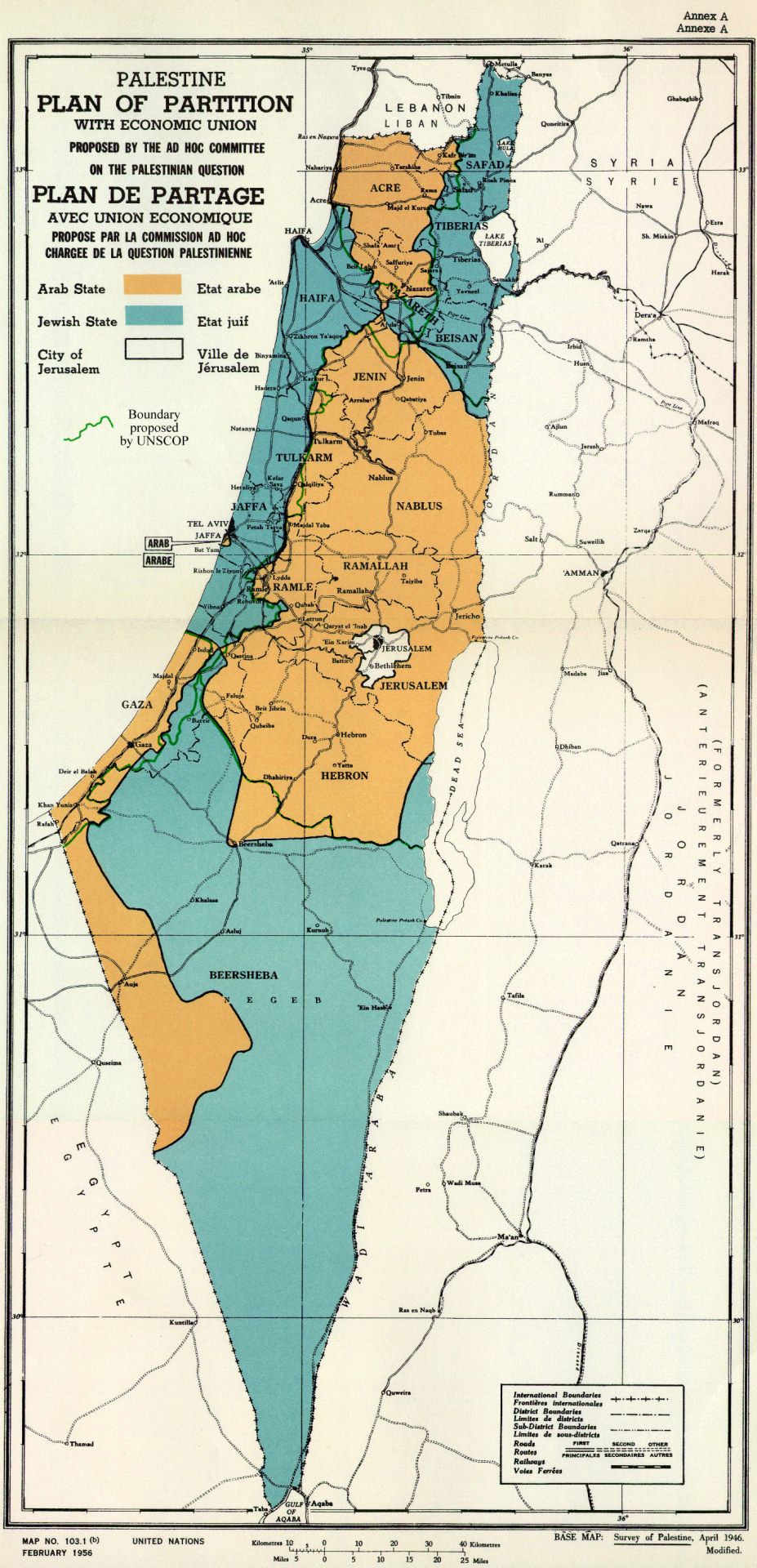
On May 14, the State Of Israel declared independence within the borders shown in blue on the map. Rather than accepting an Arab state and a Jewish state, the armies of surrounding Arab states, including Jordan, Egypt, Syria, Iraq, attacked the nascent State Of Israel with the intention to destroy it in favor of an Arab state in the entirety of the former British Mandate of Palestine.
Before it was attacked, the State Of Israel had no intention to fight the Arab states or hurt the Arabs living in the borders of Israel. This is shown clearly in Israel's Declaration of Independence.
WE APPEAL — in the very midst of the onslaught launched against us now for months — to the Arab inhabitants of the State of Israel to preserve peace and participate in the upbuilding of the State on the basis of full and equal citizenship and due representation in all its provisional and permanent institutions.
WE EXTEND our hand to all neighboring states and their peoples in an offer of peace and good neighborliness, and appeal to them to establish bonds of cooperation and mutual help with the sovereign Jewish people settled in its own land. The State of Israel is prepared to do its share in a common effort for the advancement of the entire Middle East.
Direct quotes from Israel's Declaration Of Independence.
However, during the 1948 War* the majority Palestinians living in Israel fled out of fear or were kicked out. Similarly, all of the Jews living in Judea & Samaria/the West Bank were kicked out by the Jordanian army.
Massacres were committed by both sides during the war, including the Deir Yassin massacre, in which many Palestinians were killed by right-wing Zionist militias and the Gush Etzion massacre in which many Jews were killed by the Jordanian army.
Both Palestinians and Jews had to flee/were kicked out of places in which they had resided for centuries - some examples being Lydda/Lod (for Palestinians) the Old City of Jerusalem, specifically the Jewish quarter which was later looted by the Jordanian army (for Jews).
Israel ended up winning the war -- and winning more territory than had originally been given to them. This was what the map looked like after the Armistice Agreement at the end of the 1948 war:
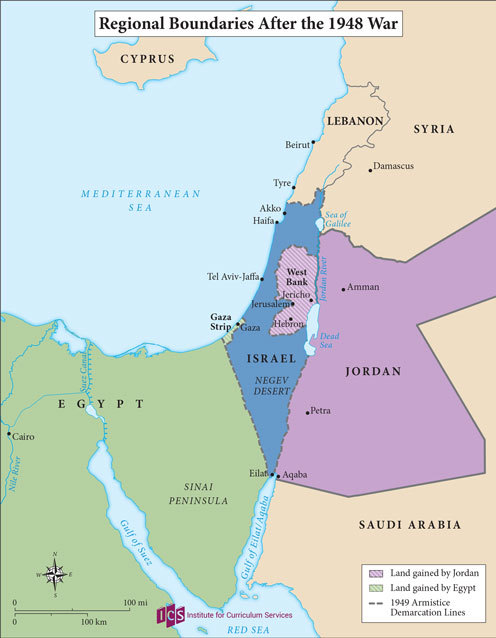
At the end of the war, Egypt occupied Gaza and Jordan occupied Judea & Samaria/the West Bank. There was no Palestinian state.
During and in the aftermath of the 1948 War, 700,000 Palestinians became refugees from Israel, and between 17,000 and 40,000 Jews became refugees from Judea & Samaria/the West Bank and Gaza, and about 1 million Jews became refugees from the rest of the SWANA region.
This post is in no way an exhaustive or authoritative history, but it shows clearly the history of the 1948 War is much more complicated than "forcefully took that land from them".
If you would like me to make a post about history pre-1948 I can do that as well.
*I chose to call this war the 1948 war so as to be impartial as possible. Other names used include the 1948 Arab-Israeli War, Israel's War Of Independence, and the 1948 Palestine War.
Keep reading below the cut for sources.
SOURCES:
#jumblr#jewish#chana talks#judaism#am yisrael chai#israel#i stand with israel#antisemitism#i/p#i/p conflict#jordan#egypt#gaza#palestine
187 notes
·
View notes
Text
Shoutout to all Middle Eastern LGBTQ+ folks.
Shoutout to all Arab LGBTQ+ folks.
Shoutout to all Egyptian LGBTQ+ folks.
Shoutout to all Iranian LGBTQ+ folks.
Shoutout to all Turk LGBTQ+ folks (if you consider yourself so).
Shoutout to all Persian LGBTQ+ folks.
Shoutout to all Iraqi LGBTQ+ folks.
Shoutout to Kurd LGBTQ+ folks.
Shoutout to all Assyrian LGBTQ+ folks.
Shoutout to all Maronite LGBTQ+ folks.
Shoutout to all Yemeni LGBTQ+ folks.
Shoutout to all Aramean LGBTQ+ folks.
Shoutout to all Qatari LGBTQ+ folks.
Shoutout to all Bedouin LGBTQ+ folks.
Shoutout to all Jordanian LGBTQ+ folks.
Shoutout to all Shabak LGBTQ+ folks.
Shoutout to all Saudi LGBTQ+ folks.
Shoutout to all Chaldean LGBTQ+ folks.
Shoutout to all Kuwaiti LGBTQ+ folks.
Shoutout to all Palestinian LGBTQ+ folks.
Shoutout to all Bahraini LGBTQ+ folks.
Shoutout to all Druze LGBTQ+ folks.
Shoutout to all Cypriot LGBTQ+ folks.
Shoutout to all Omani LGBTQ+ folks.
Shoutout to all Lebanese LGBTQ+ folks.
Shoutout to all Syrian LGBTQ+ folks.
Shoutout to all Copt LGBTQ+ folks.
Shoutout to all Emirati LGBTQ+ folks.
Shoutout to all Turkoman LGBTQ+ folks.
Shoutout to all Pakistani LGBTQ+ folks.
Take pride in it all. Your culture, your identity, it’s all so beautiful. Celebrate where you are from and who you are. It makes you you, and that is something to be proud of.
I’m aware some of those of these ethnicities don’t consider themselves Middle Eastern, so take this with a grain of salt and just an opportunity to celebrate who you are :)
post for Asians, post for Pacific Islanders, post for Oceanic people, post for Hispanics, post for Africans, post for Native Americans, post for Caribbeans
#honestly I’m not too familiar with what is considered a middle eastern ethnicity so please correct me if any are missing or wrong#positivity#self care#mental illness#self help#recovery#mental health#ed recovery#pro recovery#actuallytraumatized#actually cptsd#lgbt#lgbtq#lgbt positivity#gay#lesbian#wlw#sapphic#trans#transgender#nonbinary#queer#asexual#aromantic#intersex#genderfluid#actually autistic#bpd#traumacore#pansexual
188 notes
·
View notes
Photo
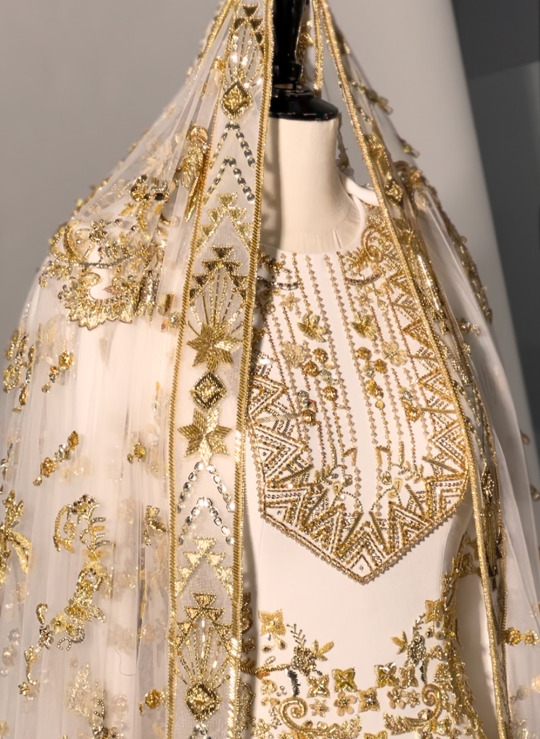
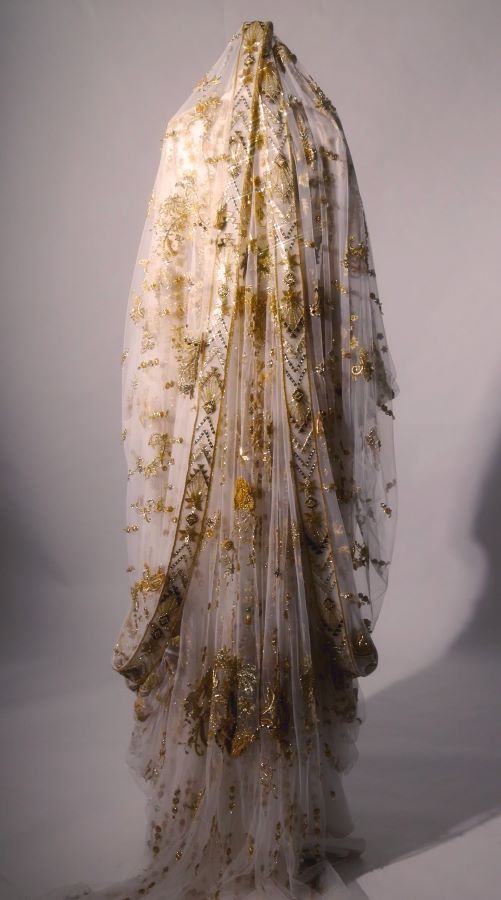
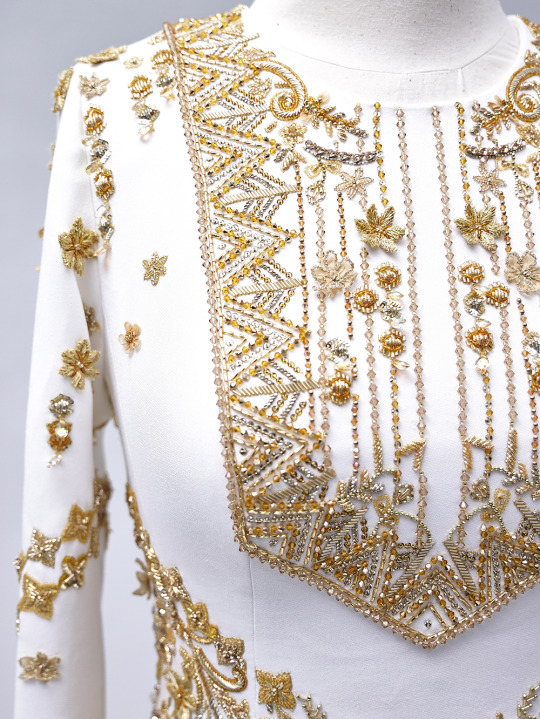
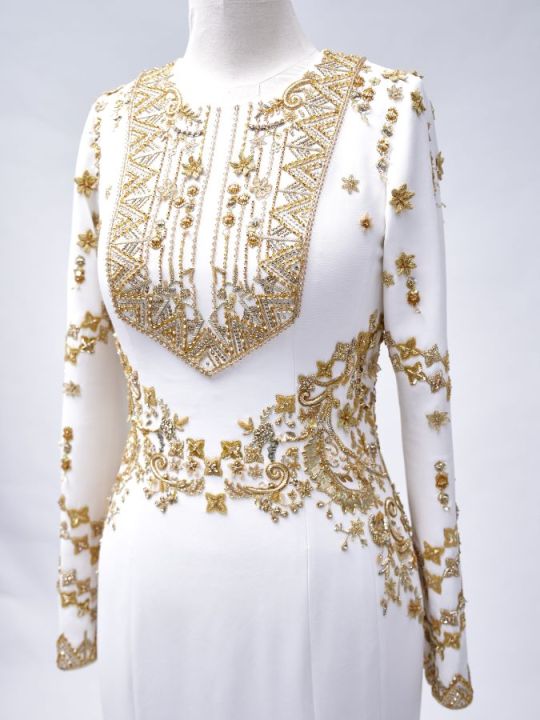
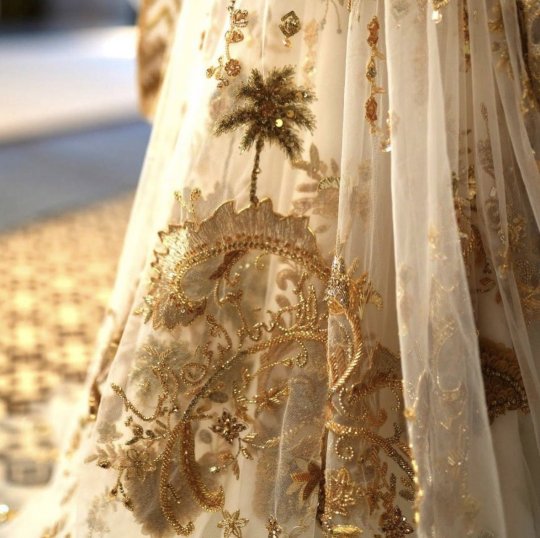
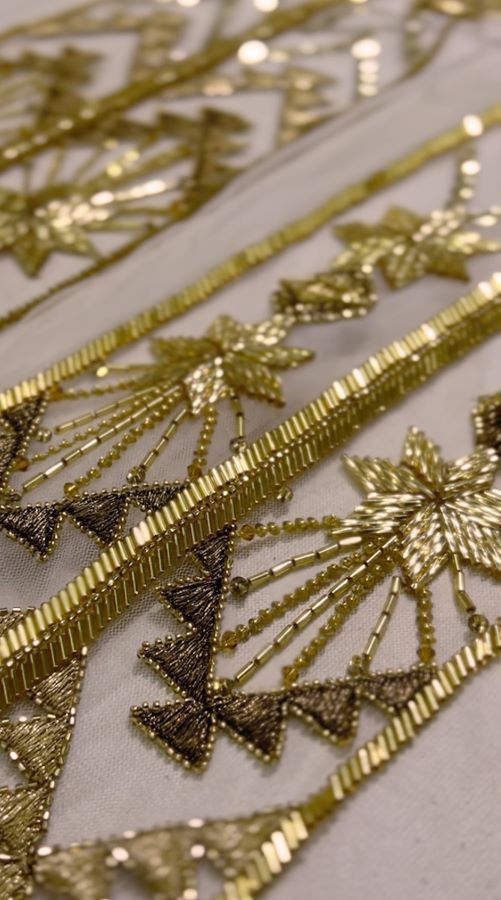
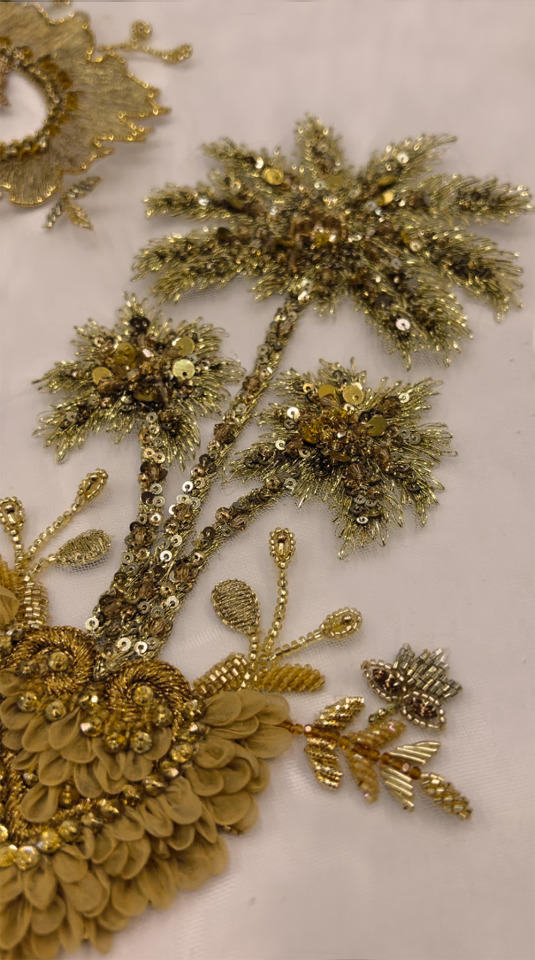

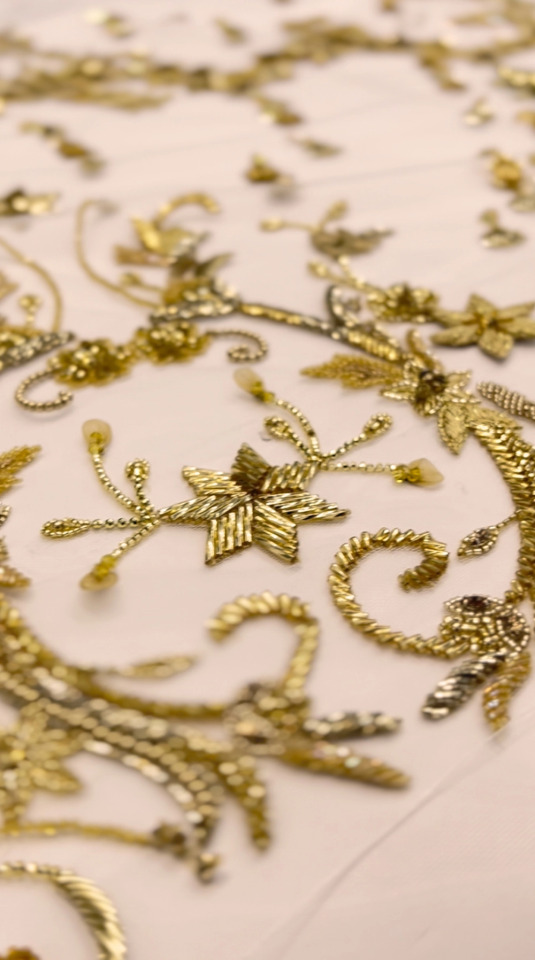
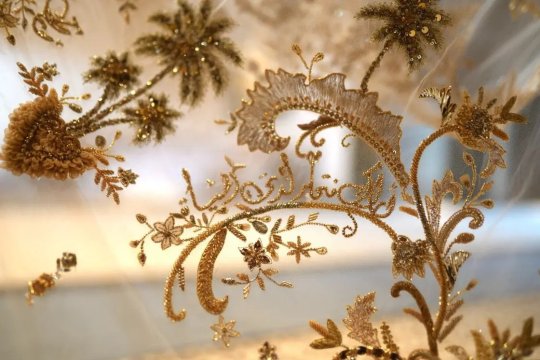
Close-up of Rajwa Al Saif's henna party outfit on 22 May 2023. The dress, by Saudi designer Honayda Serafi, took more than 2,000 hours to create, and includes several hidden messages of love, Vogue Arabia reports.
“Crafted by Saudi designer Honayda Serafi, Al-Saif’s henna dress is a vision in white and gold. The future queen of Jordan celebrated with family and friends in a look that takes inspiration from the traditional Najdi dress, known as Sahabi thoub, which originates from the Najd region of the Kingdom of Saudi Arabia. Keeping in mind the occasion and the family, Serafi made sure to combine the cultural beauty of the Hashemite kingdom of Jordan and the Kingdom of Saudi Arabia to celebrate the union of Rajwa and Prince Hussein beautifully.
Featuring a handcrafted veil and dress, Rajwa Al-Saif’s pristine white henna outfit comes doused in 3D ornaments, made using a mix of silk, metallic threads and traditional reed strings (a signature element of Najdi embroidery). To create this masterpiece, Honayda Serafi took cues from the bride’s personality, attempting to reflect her innate grace, the rich traditions of her land, and her contemporary spirit.
Look closely, and you’ll notice that Al-Saif’s gown is replete with lovingly made details. Featuring a high round neck and full sleeves, the crepe gown features an inverted triangle-shaped bodice that is inspired by the traditional Najdi bodice design, normally worn as a separate piece. As the body-skimming gown continues, it flares out towards the ankles to create a mermaid-esque shape. The bodice of the gown is elevated using embroidery: soft organza flowers share space with geometric shapes and Arabic motifs, all of which are typical to Saudi Arabia and reflect the beauty and traditions of the bride’s homeland.
Rajwa Al-Saif’s veil has also been embroidered with meaningful designs, making this piece so personal to her journey. Seven Jordanian stars adorn her veil to signify the seven-pointed star that sits proudly on the Jordanian flag. What makes this symbol even more special is its religious meaning: The star on the Jordan flag signifies the seven verses in the opening chapter of the Holy Qur’an, and the seven mountains of Amman.
Along with the stars, the veil also features intricate palm trees as a reference to Saudi Arabia, and even some poetry. The words “I see you, and life becomes more beautiful” have been embroidered into Al-Saif’s veil, from Tunisian poet Abu al-Qasim al-Shabi, known for his Andalusian notes. If you’re a fan of Rajwa Al-Saif’s elegant wardrobe, you may already know that the bride-to-be has a soft spot for special symbols when it comes to her clothing. Back in August 2022, when Rajwa was officially engaged to Prince Hussein, she also commemorated the occasion with her clothing—an abaya that was embroidered with two gold birds, symbolizing two souls in love.”
The veil took 760 hours to complete
An exquisite piece of couture requires hours of effort, and Rajwa Al-Saif’s henna outfit is no different. According to the designer, Al-Saif’s veil took 760 hours to complete, and was worked on by a team of experts, craftsman and women. Extending to 10 meters, the piece was made using handcrafted tulle, a process that normally takes close to 2,000 hours of work. As for her billowing gown, the creation is the result of 340 hours of work.
Honayda Serafi: “I am very proud and honored to be part of this historic union”
Speaking on the occasion, Serafi shared, “I am very proud and honored to be part of this historic union between His Royal Highness, Crown Prince Al Hussein bin Abdullah II of the honorable Hashemite family, and Miss Rajwa Khalid Alseif. May they be blessed with happiness and their union be crowned with success.” (x)
804 notes
·
View notes
Text
Support Palestinian Musicians & Artists :
Here is a list of Palestinian musical artists, musical groups & bands, to make it easier for you to stop supporting musicians and artists who support genocide and occupation…
Faraj Sulieman : a solo musician who makes musical works that are very piano & jazz infused with a hint of rock n’ roll. He has performed in many countries in Europe and the Middle East. He has released 10 albums in the last 10 years, one of them being a children’s musical album called “Faheem” that found major success with the voices of the 2 kids, Faheem Abu Hilu and Hala Qassis, that were very dominant in the album alongside the sound of classical piano played by Faraj Sulieman himself. He also made the soundtrack for the Palestinian movie “200 meters” directed by Ameen Nayfeh. (Recommended Works : Better Than Berlin / Second Verse / Upright Piano)
DAM : a rap band founded in 1999 by the 2 brothers Tamer and Suhel Nafar along with their friend Mahmoud Jrere, the 3 rappers who came out of the city Lod [a mixed city that has indigenous Palestinian citizens & zionist Israeli settlers] make songs mostly about the inequality in the authorities’ treatment towards Palestinians, and songs criticizing the Palestinian society living in occupied territory under the Israeli Government… They primarily rap in Arabic, yet they sometimes use English & Hebrew as well. In recent years the female artist Maysa Daw has joined the band replacing Suhel Nafar and adding a feminine perspective to the band’s niche. It’s also important to mention that DAM was the first ever hip-hop band in the entirety of the Middle East. (Recommended Works : Ben Haana Wa Maana / i don’t have freedom)
Tamer Nafar : as mentioned before, he is a Palestinian rapper and actor and one of the founding members of DAM. Besides his works with DAM he also produces music under his own name, sometimes collaborating with various Palestinian & international artists. He also participated in making the soundtrack for the film ‘Junction 48’. (Recommended Works : The Beat Never Goes Off / Johnnie Mashi)
Maysa Daw : a solo musician, singer & songwriter, and as mentioned before the freshest and newest member of the band DAM, and a member of the newly formed female group called Kallemi, She was featured in Vogue Arabia 2019 as one of 5 Arab stars setting the world of art, culture and entertainment. She is also the daughter of the actor and director Salim Daw. (Recommended Works : Asli Barri / Between City Walls)
47SOUL : a group of four men who are all originally from Palestine that have created a new music genre called “Shamstep” which is an electronic dance movement mixed with the sound of Palestinian & Middle Eastern folklore. The musical group was formed back in 2013, and since then they’ve become pioneers in that unique style of theirs and have been on tours all over the world from the US to the UK and of course the Middle East. They’ve performed in NPR’s tiny desk in 2019 which helped them gain even more international recognition. (Recommended Works : Shamstep / Semitics / Shireen)
El far3i : he is a Palestinian-Jordanian rapper, singer, songwriter, and percussionist. He is currently a member of the Shamstep band 47Soul, and was formerly a member of the Arabic rock band El Morabba3. He started his career in 2012, and has since released six solo albums. (Recommended Works : Tghayarti)
Shabjdeed : Straight out of the restless town of Kufr Aqab, Palestine, emerged a talent by the name of Abu Othaina. With his controversial takes and raw skills Shabjdeed was an instant addition to the Palestinian rap scene. After gaining traction from his self-titled track, he caught the attention of Al Nather, a local producer, and worked with him to create the alter-ego Shabjdeed; an act that can easily be considered one of the most influential and popular in the region. The duo developed their own niche dark hip-hop and trap style combining Shabjdeed’s nihilistic and daringly personal delivery style with Al Nather’s colourful and rhythmic instrumentals. From the beginning they have been able to build a dedicated fanbase, grossing over 1.5 million total streams on Soundcloud across two years whilst only relying on word-of-mouth advertisement. The duo have created together a record label and named it BLTNM Records which was brought to it’s biggest success with the release of Shabjdeed’s first full length album called “Sindibad el Ward”. And today Shabjdeed’s music is the modern voice for not only the Palestinian revolution, yet for the entire revolution in the Middle East caused by youth that dream of a better future and go against their capitalist and money hungry governments. (Recommended Works : Fi Harb / Aadi / inn ann / Ko7ol w 3atme)
Daboor : A Jerusalemite rapper to the bone, Daboor’s debut single “Liter Black'' was released in 2020 to much fanfare and critical acclaim. His unique style and raw talent cemented his status in the rap scene and he was soon signed to BLTNM Records. Daboor’s words touch on the violence of the occupation, and his delivery mimics it with brutal bursts of staccato. (Recommended Works : Inn Ann / Dolab)
Lina Makhoul : an independent American-born Palestinian singer-songwriter & producer. She was raised in the city of Acre in occupied Palestine since the age of 4 and according to her she has showed interest in music and dance since a young age. She started her career in 2012 and has since released 1 full length album as well as a number of hit singles, She also opened for Queen+ Adam Lambert in 2016 and toured with Little Mix in 2017. (Recommended Works : Shway Shway / Fish Masari / 3 sneen)
Elyanna : a Palestinian-Chilean singer-songwriter who started her career in 2018 and has since released 1 full length album and a number of singles, and she has collaborated with artists with significant recognition such as Massari. She performed in Coachella 2023 to become the 1st ever Middle Eastern & Palestinian artist to perform in Coachella in Arabic. (Recommended Works : Ana Lahale / Ghareeb Alay)
Noel Kharman : She is best known for doing mashup covers where she mixes Middle Eastern and Western music, creating a unique bridge between these two worlds through her powerful and angelic voice. She started her career on Youtube with covers of viral songs, but her big breakthrough happened in 2015 when she published her first mash-up cover which was a mix of ‘Hello’ by Adele with Fairuz. The cover went viral overnight and since then, she became an instant internet sensation. The cover has gained over 30 million views on YouTube. Today she has released many songs of her own after being signed to a record label and has collaborated with various artists and went on tour in many cities in the Middle Eastern region. (Recommended Works : Ya Lali)
The Synaptik : This Palestinian-Jordanian artist based in Palestine started making music at the age of 17. The Synaptik studied medicine for 7 years and graduated. His stage name is derived from his fascination with the nervous system, neurotransmitters and his personal experience with ADHD, which led to calling himself The Synaptik: “…because that’s where things happen.” The Synaptik has pioneered a new wave of sound for the Arab youth. His honest and potent lyrics are highlighted by his songwriting style that merges singing and rapping effortlessly. With a tsunami of a first album under his belt, dozens of local, regional, and international shows and a much-anticipated second album, The Synaptik has cemented his status as one of the pillars in the Hip Hop scene in the region. The Synaptik has collaborated with numerous artists from all over the Middle East such as rap superstars Abyusif, Wegz, Marwan Mousa, Chyno with a Why?, Shabjdeed and more. (Recommended Works : Sabelek)
Apo & The Apostles : Apo & the Apostles started out late 2013 in Jerusalem-Bethlehem with their first release in March 2014. Since then, they've been taking their music to whoever and wherever they are welcomed. The band is known for their energetic performances that turn to parties and after-parties. (Recommended Works : Baji Wenek)
#palestine#palestinian art#palestinian artists#palestinian music#music#i stand with palestine 🇵🇸#free palestine 🇵🇸#stop palestinian genocide#palestinian lives matter#from the river to the sea palestine will be free#save palestine#palestina#filistin#from the river to the sea 🇵🇸#filistin 🇵🇸#فلسطين 🇵🇸#free gaza#gaza#gaza strip#gazaunderattack#gazaunderfire#save gaza#free palestine#free free palestine#end the genocide#end the occupation#end the war#end the siege#end the apartheid#gaza under attack
199 notes
·
View notes
Text
In 1920, Syria Palestina was a Roman-named colony or region, not a country, (aka Palestine), stretching from Iraq to southern Syria, and of course, there was no country called Jordan.
The word Palestine was 100% derived from the Hebrew name for the Philistines. There is no evidence of a written language left by the philistines and the only name that they were known by was the name given to them by the Hebrews at the time. The evolution of the word went something like this:
פלש—פלישתים—ארץ פלשת—סוריה פלסטינה/פלשתינה—פלסטין/פלשתין
PaLaSh—plishtim—the land of paleset—Syria Palestina (the name given to the land of Israel and Judea as a punishment by the Roman)—- Palestine
PaLaSh is the Hebrew root word for invade meaning we called the sea fairing invaders by their actual name, invaders
Important to know that the Arabs absolutely DENIED ANY RELEVANCE and would not ascribe and meaning re: "Palestine" for themselves.
Arab nationalists in the post-WWI period ADAMANTLY rejected the designation. Arab spokesmen continued to insist that the land was, like Lebanon, merely a fragment of Syria. On the grounds that it dismembered an ideal unitary Arab state, they fought before the Anglo-American Committee of Inquiry and at the United Nations. The Arab historian Philip K. Hitti informed the Anglo-American Committee of Inquiry that “there is no such thing as Palestine in history.”
In 1937, Awni Bey Abdul-Hadi, founder of the first Palestinian Arab political party, testified to the Peel Commission, "There is no such country as Palestine. 'Palestine' is a term the Zionists invented. There is no Palestine in the Bible. Palestine is alien to us."
In May 1956, Ahmed Shukairy, who became the first head of the Palestine Liberation Organization (at a time when Jordan had annexed the "West Bank" and Egypt controlled Gaza), declared to the United Nations Security Council, “It is common knowledge that Palestine is nothing but southern Syria.”
In February 1970, Prince El Hassan bin Tala of Jordan, stated to the Jordanian National Assembly that "Palestine is Jordan and Jordan is Palestine; there is one people and one land, with one history and one and the same fate." Seven months later, the PLO attempted to take over Jordan, lost, and were unceremoniously, kicked out.
In 1977, PLO Executive Committee member Zahir Muhsein stated, "The Palestinian people do not exist. The creation of a Palestinian state is only a means for our continuing struggle against the state of Israel for our Arab unity. … In reality there is no difference between Jordanians, Palestinians, Syrians, and Lebanese."
One might argue that this particular group of Arabs established, sometime in the mid 1960s, a political identity as "Palestinians," when Arafat returned from strategic partnership meetings with the Soviets communists who were attempting to gain a larger foothold in the region, and advised him how to use "Palestine" identity as a cudgel against Israel.
What they are NOT is "ancient" inhabitants of the region which, under Ottoman rule, was also dubbed "Syria-Palestine." What they are NOT is any sort of distinct ETHNIC group—like the Judeans (Judea/Samaria/Israel), the Phoenicians (Lebanon), the Kurds, the Druze, or the Circassians. They are Arabs, sharing the language, culture, religion, cuisine, ethnic group, etc. of the people of Syria, Lebanon, Jordan, Egypt, and Saudi Arabia. Prior to the 1960s, before the PLO was created, there were ZERO Arabs self-identifying as Palestinians. During the 19 years that Jordan controlled the so-called "West Bank" (Judea and Samaria, which had been cleansed of Jews by the Jordanians) and when Egypt controlled Gaza, there was no movement to create a "Palestinian" state.
Attached is a photo of the Palestine Symphony Orchestra in 1936, which consisted of 73 jewish musicians, and conducted by none other than Arturo Toscanini (born in Parma, father was a tailor). Toscanini was the music director at La Scala, before spending spent 7 years conducting the New York Metropolitan Opera (1908-1915) and the New York Philharmonic (1926-1936). He lived out his latter years in NYC, about a 1/2 mile from where I lived for a decade from 2005-2015 in Riverdale (Bronx), which is now called Wave Hill, a non-profit cultural institution and botanical garden, located on 26 acres adjacent to the Hudson River.
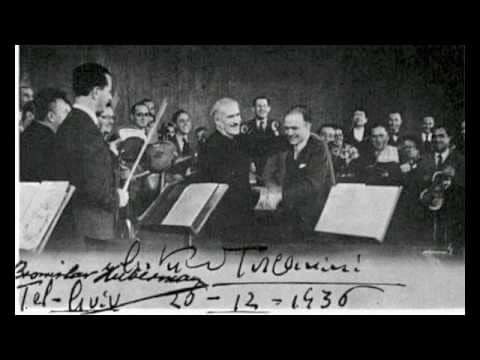
#syria palaestina#peel commission#judaism#israeli#israel#secular-jew#jewish#jerusalem#diaspora#secular jew#secularjew#islam#12 tribes of israel#samaria#judea#judean#rome#hadrian#philistines#kurds#phoenician#riverdale#bronx#toscanini#israel philharmonic symphony#palestine symphony orchestra#symphony#orchestra#syria#roman occupation
46 notes
·
View notes
Note
what's the food people are most surprised you don't like? for me it's dark chocolate
I hate dark chocolate too😁
But people are most surprised I don’t like kashta. Because it’s such a large part of Arab culture and I just can’t for the life of me like the taste.
I also don’t like milk and rice which again, huge part of culture I just can’t stand it. And basically anything white, I hate white foods.
Except mansaf it has my heart
#it’s a weird thing not to like this stuff#especially because it’s such a huge part of Palestinian and Jordanian and even Lebanese culture#I just can’t stomach it for the life of me#kashta#and rose water#and all those flavors do not taste good to me
68 notes
·
View notes
Text
This stunning collection of attires is a heartfelt celebration of the timeless elegance and cultural richness of Palestinian and Jordanian fashion 🖤🤍💚♥️🇵🇸🇯🇴
هذه المجموعة المذهلة من الملابس هي احتفال صادق بالأناقة الخالدة والثراء الثقافي للأزياء الفلسطينية والأردنية
🖤🤍💚♥️🇵🇸🇯🇴
#oriental#orient#orientalart#muslim#muslimah#muslimfashion#digitalart#arab#islam#hautecouture#highfashion#palestine#palestina#gaza#stopgenocide#keffiyeh#jordan#jordanie
39 notes
·
View notes
Text
i BARELY ever hear anyone talk about this, but it deserves to be written about more… can we please have middle eastern sirius and regulus? like, sirius and regulus who’s mom is egyptian or lebanese or syrian or turkish or jordanian (or whatever middle eastern country you want!) and their dad is french and they grow up in a mixed race home. sirius who goes to hogwarts and feels so different because everyone is white but then he meets james!! sirius and james who share cultural dishes and can relate to each other when it comes to feeling different!!
#PLS give me middle eastern sirius and regulus it would make me very happy (im middle eastern)#marauders#the marauders#harry potter#sirius black#james potter#regulus black
71 notes
·
View notes
Note
Hi, I’m an Iraqi girl currently in Baghdad, this is a fact that I’ll never reveal to anyone on the internet for multiple reasons, from privacy to just the fact that I know I wouldn’t be able to hold it together if racists found me, I’m terrified, terrified of what Iran and the US would do to my home, I love Iraq, its culture, its beauty, it’s everything, yet I feel like when I finally start a life for myself I’d wanna get out, I don’t want to, this country holds so many memories dear to me, yet I can’t live in fear wondering if my home would be attacked the next day, I went to college today and me and some friends started talking about the missiles that were spotted yesterday, and we joked that even if there’s war we’d still be forced to attend college, yet I think that all of us were just saying it because we’re scared, I’m sick and tired of white-supremacists destroying my home and culture, you said your mother fled Iraq after the US invasion and my mother did too, we fled to Jordan where we already had some family there, but, we couldn’t stay, not because it wasn’t safe for us there, but it was my mom, my mom is a general surgeon, a fact that she considers one of her greatest achievements, she’s not done because she’s currently getting her doctorate, but she wasn’t allowed that when she was in Jordan, she wasn’t allowed to work as a doctor, she wasn’t allowed to even CLAIM she was a doctor, she got pissed because she didn’t work her ass off so that she’d be denied that right, so we came back about two years later, at least by then it was somewhat peaceful? Still sucked but it was ever so slightly safer, racism towards Arabs doesn’t just come from Europe and America, it also comes from our own neighbours, I don’t know what point I’m trying to make of this, I just needed to get it off my chest and felt like this was the safest place to do so, thank you in advance for listening
Hi no it’s so incredibly important that you sent me this. So many people have sent me asks about how “Iraq has shut down its airspace in collaboration with Iran,” which I understand. I understand that Iraq is aligned with Iran. I understand it was a necessary counterattack. But I also think it’s so important to humanize the Iraqis residing there, who live in fear regardless, who understand that with this war there will always be the “collateral damage” civilians. It’s not fair for you to be be joking about war while westerners abroad debate the political connotations of something that doesn’t even directly affect them.
And yeah, unfortunately Jordanians have always been racist to Iraqis. My uncle’s family encountered similar problems when he moved there—he basically had to fly between Iraq and Jordan regularly, bc it’s impossible to find a stable job in Amman. I feel for your mother. I feel for the fact that she didn’t want to throw away all her hard work. This is the rock and a hard place conundrum Iraqis are stuck between. Not religious but I’m still praying for your safety, for your mother��s safety, and for you to never have to know what it feels like to be going to school while Iraq is caught in the middle of war. It has had enough war to last it a lifetime. I’m sorry angel
44 notes
·
View notes
Text

“we all know Rajwa was born in Saudi but maybe the *ONE* time that wearing a Jordanian designer was necessary was for her father-in-law's silver jubilee as king of you, know…Jordan?! her identity is not erased by marriage but she needs to start embodying that Jordanian culture, unless she is not allowed to ;)” - Submitted by Anonymous
“Rajwa was so ravishing at the Jubilee, my only “but” is she didn’t wear a Jordanian designer, I love when a new royal enters the scene and picks a local designer as her #1 (thinking of Kate and Sarah Burton) Nothing against Saudi fashion but that front is already championed generously by its own royalty…hope Rajwa turns her eye to local Jordanian fashion soon.” - Submitted by Anonymous
35 notes
·
View notes
Text
tips for writing arab characters
writer here!! im a middle eastern writer whos noticed that theres a VERY significant lack of info on how to write arabs, so im here to help !! (however, keep in mind that im specifically gulf arab and may not be able to provide as much info on levant arabs or north african arabs. if there are any on here, feel free to reblog w more info !! )
dont get arabs mixed up w muslims. yes, a large portion of the arab population are muslim, but youd be surprised at the number of non-muslim arabs that exist. if you wanna write abt a muslim character, a post i made that might help is here
list of arab countries, with the adjective:
algeria — algerian
bahrain — bahraini
the comoros islands — comorans
djibouti — djiboutian
egypt — egyptian
iraq — iraqi
jordan — jordanian
kuwait — kuwaiti
lebanon — lebanese
libya — libyan
morocco — moroccan
mauritania — mauritanian
oman — omani
palestine — palestinian
qatar — qatari
kingdom of saudi arabia (ksa) — saudi
somalia — somali
sudan — sudanese
syria — syrian
tunisia — tunisian
united arab emirates (uae) — emirati
yemen — yemeni
dialects/language:
dialects greatly differ—the egyptian dialect is the most common, followed closely by the levantine dialect
classic arabic is called fusha (fuss-ha), used in things like official documents, media, education. every arab knows it but its not used in day to day language except in media (all dialects basically come from fusha, but with slight changes)
'p' and 'g' (as in 'gurgle' or 'goal') dont exist in the arabic alphabet, theyre replaced with 'b' and 'j'
depending on where theyre from, they may also learn a third language besides arabic and english (e.g. moroccans know french, a berber arab may know berber)
appearance:
arabs look different based on where theyre from. if theyre from the arabian peninsula, they have thick curly dark hair, tanned skin, and dark eyes. levant arabs are lighter skinned, and green/blue eyes are more common with them
adding on to previous point, arabs have a variety of skin tones, even if theyre siblings. using a real example, me and my older brother respectively look white passing and afro hispanic
dark irises are considered better looking than lighter colored eyes. eyes are usually thick-lashed, with big round slightly upturned eyes
big noses are common, along with full lips (and hereditary dark circles for those with more tanned skin)
high cheekbones and well structured faces are also prevalent
culture:
varies depending on location
influenced by indian culture, IS NOT INTERCHANGEABLE WITH INDIAN CULTURE. that was aladdins mistake
poetry is so common, especially with romantic themes
songs also have romantic themes
youd be surprised at how romantic arabs are
dances vary extremely, from dabke (palestinean dance done in groups, consisting largely of leg/foot movements) to yola (emirati dance with battle origins, done using canes or fake guns) i recommend watching videos (tiktok has a lot of videos esp of dabke)
women also dance but you wont find a lot of videos of it bc its inappropriate
etiquette:
things such as giving someone your back, or facing the bottom of your feet towards someone are considered rude
pda is also taboo (even with straight couples or even sometimes married couples)
cheek kisses are a common way of greeting, but not between genders
in some gulf countries, men greet each other with a nose kiss (not in an intimate way) just stubbing their noses against each other
genders do not mix at all. schools tend to divide girls and boys into two sections starting at a certain age (around age 10/11), and mosques are split into the mens side (usually larger than womens bc men use the mosque more)
having an extramarital relationship is very very taboo (even w hetero relationships) but it still happens. a lot.
family dynamics (note that this is obviously a spectrum. this is the general dynamic, but obv it ranges from family to family):
NOT ALL OF US HAVE ABUSIVE PARENTS. sure theyll spank you if you skip school, but thats not necessarily abusive. its more strict, and youd be surprised at the amount of freedom some parents give their kids
yes, arranged marriages do happen. no, they arent necessarily forced, it just means that your parents had a hand in deciding who youll marry. yes, marrying cousins is a thing, but its much less prevalent now (also, ew)
fathers care. a lot. they dont show it, but they do. they also tend to joke around a lot
mothers tend to be the rule enforcers, and by far our moms are our best friends. we tell them EVERYTHING i swear
aunties gossip a lot
uncles are a safety hazard
its not uncommon to have a large number of cousins (mainly bc arabs tend to have a lot of kids)
the average number of children 3 per woman, but from personal experience the older the generation the more kids (e.g. my great-grandmother had a whopping thirteen kids, my grandmother had seven, my mom has six, but a couple of my aunts only have one or two)
social class/work environment/school environment:
schools tend to be either arab curriculums but there is a high density of american/british curriculum schools
boys and girls tend to be separated in school around age nine/ten but some schools will be mixed genders up till graduation
yes, women work, tho admittedly some of them tend to have careers more than jobs (e.g. photographer, writer, etc while the men handle engineering, economics, etc)
no, not all of us are rich. in fact, countries like jordan, egypt, tunisia, morocco, and yemen (and infamously palestine) are acc struggling w poverty. its mainly just gulf arabs who are rich
furthermore, gulf arabs may be generally rich but a large chunk of them have the same lifestyle as an upper-middle class family in the usa. rich but not too rich. dont be fooled by the videos of guys wearing kandoras and driving lambos
speaking of kandoras...
outfits (keep in mind that spelling may vary since its all transliteration, and pronunciation may vary depending on region) (also keep in mind that even if we still live in the middle east, WE CAN WEAR JEANS AND HOODIES AND BAND SHIRTS. just, usually cover up more in public):
abaya: loose overgarment worn by women
jilbab/chandoor: also worn by women, type of long dress or tunic
the white robe all of yall know is known as a thobe, dishdasha, or kandora
the colored headscarf worn by men is known as a ghuthrain in the gulf, kevfiah in the levant. its kept in place with a black cord called a aghal, and under it they wear a skullcap called a thagiyah
those are the most common ones, however if youd like to get a lil more specific on clothong, the ultimate guide to arab clothing is here (it also has specified clothing for individual countries)
hope this helps, feel free to reblog w more info if you have any !!
#writing tips#writing arabs#arab#writer sources#writing help#writers on tumblr#writeblr#writing advice
118 notes
·
View notes